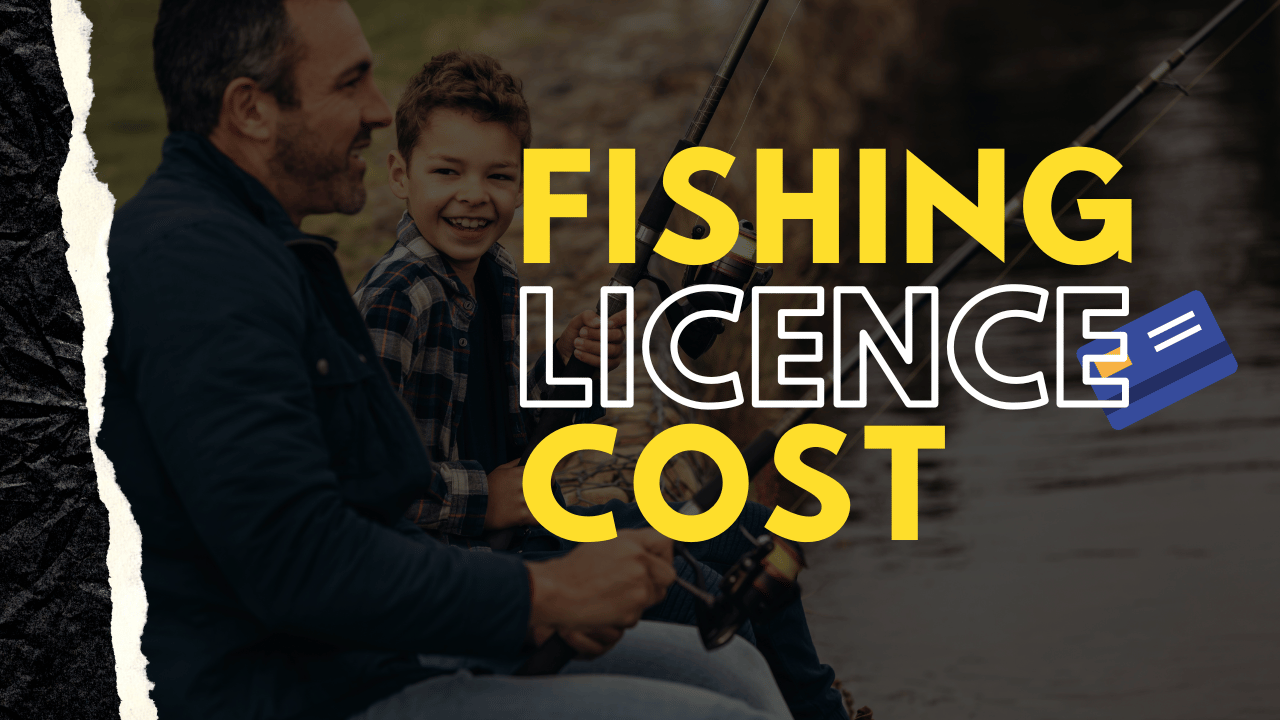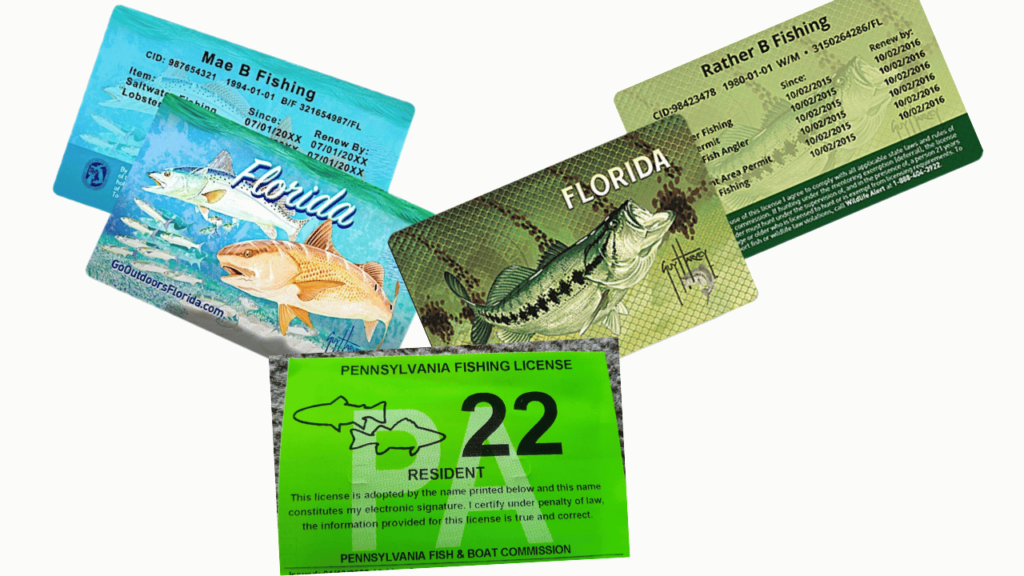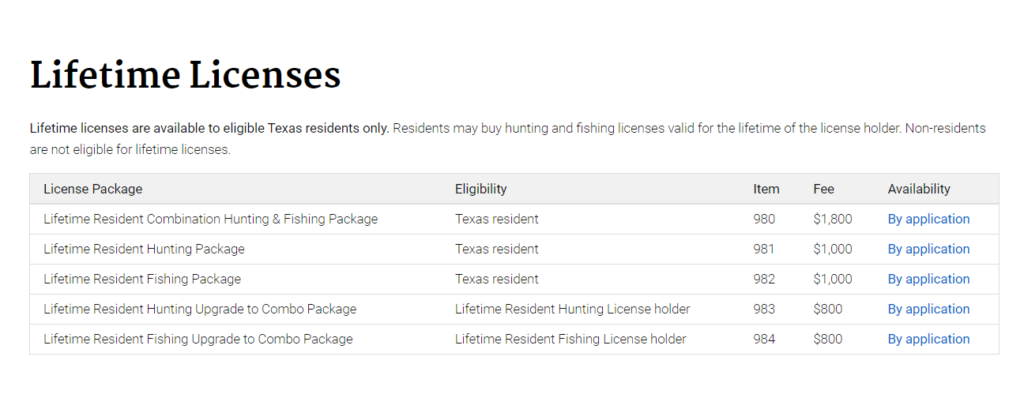One of the first things a fisherman need to do before heading out on a fishing trip is to get a fishing license. A fishing license is a legal permit that enables you to fish in public waters and is required by law in the United States.
But how much does a fishing license cost? Well, it depends on several factors such as your location, residency status, age, and duration of the license.
An annual freshwater/saltwater fishing licence will generally be more expensive than short-term licenses because it covers all four seasons instead of just one specific time period.

Table of Contents
How much is a fishing license?
So, let’s talk about the average cost of fishing licenses in the United States. How much is a fishing license varies depending on where you live and what type of license you need.
Each state has its own wildlife department that sets its licensing fees for residents and non-residents, and these fees can change from year to year. Generally, an annual fishing license fee for residents ranges from $10 to $60, while non-residents can expect to pay anywhere from $25 to $300.
Short-term licenses are also available in some states, which typically range from one day to seven days in duration and cost around $5 to $40.
Read also: What Is Fly Fishing? How Doest fly fishing Work!
Cost of Fishing Licenses by State 2023
Here’s the fishing license costs by states in the USA:
| State | Cost |
|---|---|
| Alabama | Annual Freshwater: $13.85, Annual Saltwater: $24.35 |
| Alaska | Annual Fishing: $29, Annual Salmon Stamp: $10 |
| Arizona | Annual Fishing: $57 |
| Arkansas | Annual Fishing: $10.50 |
| California | Annual Saltwater Fishing: $48.34 |
| Colorado | Annual Fishing: $25.00 to $33.00 |
| Connecticut | Annual Marine Waters Fishing: $10 |
| Delaware | Annual Fishing: $8.50 |
| Florida | Annual Saltwater: $17.00 |
| Georgia | Annual Fishing: $15 |
| Hawaii | Annual Fishing: $6.00 |
| Idaho | Annual Fishing: $30.50 |
| Illinois | Annual Fishing: $15 |
| Indiana | Annual Fishing: $17 |
| Iowa | Annual Fishing: $19 |
| Kansas | One-Time Purchase Fishing: $42.50 |
| Kentucky | Annual Fishing: $55 |
| Louisiana | Basic Fishing: $9.50, Saltwater Fishing: $13 |
| Maine | Annual Fishing: $15 |
| Maryland | Annual Non-Tidal Fishing: $20.50 |
| Massachusetts | Freshwater Fishing: $27.50 |
| Michigan | 24-Hour Fishing: $10, 72-Hour Fishing: $30, Combo Hunting and Fishing: $76 |
| Minnesota | Annual Fishing: $26.00 |
| Mississippi | Annual Fishing: $15 |
| Missouri | Fishing: $225 |
| Montana | Fishing: $31 (total for a season) |
| Nebraska | Annual Fishing: $38.00 |
| Nevada | Adult Fishing: $40 |
| New Hampshire | Fishing (freshwater): $45.00 |
| New Jersey | Resident Fishing (Ages 16-64 yrs.): $22.50 |
| New Mexico | Annual Fishing: $25.00 |
| New York | Annual Licensing: $25 (ages 16-69) |
| North Carolina | Annual State Inland Fishing: $25, Coastal Recreational Fishing: $16 |
| North Dakota | Fishing: $16 |
| Ohio | Annual Fishing: $19 |
| Oklahoma | Annual Fishing: $25 |
| Oregon | Annual Fishing: $44.00 |
| Pennsylvania | Annual Fishing: $22.90 |
| Rhode Island | Annual Freshwater: $18, Non-resident: $35 |
| South Carolina | Annual Freshwater: $10, Non-resident: $35 |
| South Dakota | Annual Fishing: $28 |
| Tennessee | Annual Fishing: $34 |
| Texas | Freshwater Package: $30, Saltwater Package: $35 |
| Utah | Annual Fishing: $34 |
| Vermont | Annual Fishing: $26 |
| Virginia | Freshwater Fishing: $23, Saltwater Fishing: $17.50 |
| Washington | Freshwater: $29.50, Saltwater: $30.05 |
| West Virginia | Annual Fishing: $19 |
| Wisconsin | Annual Fishing: $20 |
| Wyoming | Annual Fishing: $27 |
Why Do You Need a Fishing License?
Fishing is a popular pastime for many Americans, and while it can be an enjoyable and relaxing activity, there are regulations in place to ensure the sustainability of fish populations and aquatic habitats. That’s where fishing licenses come in – they’re required by law to fish in most states, both for freshwater and saltwater fishing.

But why do you need a fishing license? One reason is that a valid fishing license helps fund conservation efforts to protect these aquatic resources.
Part of the licensing fees goes toward stocking lakes and rivers with fish, as well as habitat restoration projects. This means that by purchasing your own fishing license, you’re contributing to the preservation of these natural resources.
Another reason is that a fishing license ensures that everyone who’s out on the water is playing by the same rules. It’s important for local governments to regulate fishing activities so that everyone has an equal opportunity to catch fish without damaging the environment or causing harm to other people on the water.
Plus, having a valid fishing license means you won’t be subject to fines or penalties if caught without one – which could end up being much more expensive than just buying your own license in the first place! Having your own fishing license lets you take responsibility for your actions as an angler.
Factors Influencing the Cost of a Fishing License
The cost can vary depending on several factors. You might be wondering why there’s such a range in costs, but there are good reasons for the variation.
Here are some of the key factors that influence how much you’ll need to pay for a fishing license.
Residency status (resident vs. non-resident)
One of the biggest factors that can affect the cost is residency status. In most places, residents are able to get fishing licenses at a lower rate than non-residents. This is because the funds generated from fishing license fees go toward supporting conservation and management efforts within the state or region where they are collected.
As such, those who live in the area and benefit directly from these efforts are often given a break when it comes to paying for their permits. For example, in South Carolina, an annual freshwater fishing license costs $10 for residents and $35 for non-residents.
Similarly, in Montana, residents pay just $8 for an annual fishing license compared to $50 for non-residents. These fees apply regardless of whether you purchase your permit at a local store or online through your state’s wildlife department.
It’s important to note that what constitutes “residency” can be somewhat complicated. In general, you’ll need to have proof that you live in the state or region where you want to purchase a fishing license – this might include things like a driver’s license or utility bill with your name and address on it.
However, some states may have additional requirements – for example, they may require that you’ve lived in the area for a certain length of time before being eligible for the resident fishing license rates. If you’re not sure whether you qualify as a resident or non-resident when it comes to buying a fishing license, check with your state’s wildlife department or issuing authority.
Age (adults, seniors, children)
Age can play a big role in determining the cost. Most states offer discounted rates for senior citizens and children, while adults typically pay full price.
For example, in South Carolina, residents who are 64 years and younger pay $10 for an annual fishing license, while those who are 65 and older only have to pay $5. Children under the age of 16 can fish without a license as long as they are accompanied by a licensed adult.
Non-residents may also see different rates based on their age. For instance, in California, non-resident adults must pay $135 for an annual license, while non-resident juniors (ages 16-17) only have to pay $15.
Senior non-residents (ages 65 and up) get a discount as well and only have to pay $126 for an annual license. It’s important to note that these rates may vary depending on where you purchase your license from.
Duration (annual, short-term, lifetime)
One of the most important considerations is duration. Different states offer different options, but the main types of fishing licenses you can buy are annual, short-term, and lifetime.
An annual fishing license is probably what most people think of when they hear the term “fishing license.” As the name suggests, an annual license is valid for one year from the date of purchase. The cost for an annual fishing license varies by state and can range from as low as $10 to as high as $150 depending on a variety of factors such as residency status, age, and type of fishing.
Short-term licenses are also available if you only plan to fish for a limited period. These licenses can be valid anywhere from a few days to several weeks or months depending on what your state’s wildlife department offers.
Short-term licenses tend to be more expensive than purchasing an annual license per day but may still be a good option if you don’t fish very often. For those who are serious about their angling activities, lifetime licenses are available in some states.
A lifetime license allows you to fish for free for the rest of your life without ever having to worry about renewing your permit or paying additional fees. While these licenses come with a higher upfront cost than an annual or short-term permit would cost over time, they can be more economical in the long run – especially if you plan on fishing throughout your lifetime.
Special conditions (disabled veterans, low-income seniors, recovering service members)
There are special conditions that can affect the cost of a fishing license in the United States. These include discounts for disabled veterans, low-income seniors, and recovering service members.
Many states offer these discounts to show their appreciation for those who have served our country. Disabled veterans who have a valid fishing license can receive discounts on their license fees.
This discount varies from state to state, but it is usually around 50%. Some states require proof of disability from the Department of Veterans Affairs, while others may accept a letter from a doctor.
Low-income seniors may also be eligible for discounted annual fishing licenses. In some states, seniors over 65 years old can get a resident annual fishing license at a reduced price or even for free.
To qualify, seniors must provide proof of income such as tax returns or social security benefits statements. Recovering service members may also be eligible for discounted or even free fishing licenses in some states.
To obtain these licenses, service members should visit their local government offices or their sports and outdoor department and provide proof of military service.
How and Where to Buy a Fishing License
Buying a fishing license is essential for anyone who wants to enjoy the thrill of catching fish. But where and how can you purchase a fishing license?
The answer is simple: you can buy a fishing license online from authorized agents or government offices. Most states have an online portal that allows anglers to purchase their licenses quickly and easily.
The most common place to buy a fishing license is at the state’s wildlife department office or website. In-person purchases usually require that you bring your driver’s license, as well as any other documentation that may be required by your state.
If you prefer to purchase your annual fishing license in person, check the regular business hours of the wildlife department in advance so that you know when it’s open.
Another popular option for anglers looking to buy a fishing license is Walmart stores.
*Walmart store has become a major destination for anglers because they sell fishing licenses at many of their locations across the United States.
Fishing enthusiasts often visit Walmart due to its availability to provide fishing licenses at numerous stores all over the country. To get a valid Walmart permit for fishing customers need to share personal details like name,address,date of birth,social security number etc.
They also have to pay an appropriate fee according to the period they choose(annual or short term)and whether they are residents or not plus any additional charges that may apply. Customers’ licenses fees differ depending on their length of stay and whether or not they are residents.

How much a walmart fishing license cost?
Visiting the Sporting Goods Cashwrap department at Walmart’s nearby location will allow you to purchase a fishing license. The price of a fishing license at Walmart differs based on the state, type of license, and its duration. Walmart generally charges a similar fee for fishing licenses as government offices do in your state.
Here are some indicative costs for a Walmart fishing license:
- Licenses for individual residents: $10-$79
- Licenses for individual residents of age 66 and above: $10-$40
- A one-day fishing license for both residents and non-residents: $4-$40
- Three-day tourist fishing licenses: $4-$19
Read more: Do You Need a Fishing License for Catch and Release?
How much is a lifetime fishing license?
If you’re planning on fishing for a lifetime, then consider purchasing a lifetime license with prices ranging from around $200 up to over $1,000.
If you already have a lifetime fishing license and want to renew it, you can do so at any states department of Fish and Wildlife license agent, FW license sales office.
The cost of a lifetime fishing license depends on your residency status. If you’re a resident in the state where you plan on a yearly fishing license, the cost will likely be significantly less expensive than if you’re considered a non-resident.
For example, You can see the lifetime licence cost for Texas:

FAQs
Is It Possible To Issue Licence Through Walmart?
Walmart does not issue hunting and fishing licenses. You will need to contact your state’s Fish and Wildlife agency to obtain those licenses
Do I Need A Fishing License For Catch And Release?
The answer is generally yes, unless you fall under certain exemptions. Even if you’re not keeping any fish, it’s still important to have a valid license while fishing.
One exemption to needing a fishing license for catch and release is if you’re under the age of 16. In most states, children under 16 are allowed to fish without their own fishing license as long as they are accompanied by someone with a valid license.
Does A 17 Year Old Need A Fishing License In Texas?
A person under 17 years of age is not require a fishing licence in texas.
If you’re planning on going fishing legally in Texas and you’re 17 years old, the answer is No: you need a valid fishing license.
But what if you’re not a resident of Texas? If that’s your case and you’re only visiting temporarily – perhaps as part of vacation or business trip- then it’s not necessary to obtain non resident license before casting your bait in any local waters.
Does A 13 Year Old Need A Fishing License In California?
No, if someone is 13 year old, he/she doesn’t need any licences to fishing in California. According to California deferment of fish and wildlife, a person who is 16 years of age or older must need a licence to fishing.
Conclusion
Getting a fishing license is an important step in enjoying the great outdoors and pursuing this popular hobby. While the cost of a fishing license can vary significantly based on factors like residency, age, duration, and special conditions, it’s clear that having a valid license is essential for anyone who wants to fish legally and responsibly.
Whether you’re interested in freshwater or saltwater fishing, there are many options available for purchasing fishing permits or getting a valid license. As we’ve seen throughout this article, there are many different places where you can get a saltwater fishing license too.
Walmart’s fishing license price is often quite affordable, especially if you’re looking for a one day fishing license or other short-term option. However, it’s important to note that local tackle shops and even local government offices may also issue fishing licenses in some areas.
Many states now allow you to purchase your license online for added convenience. If you’re planning to fish frequently or for many years to come, it may be worth considering a lifetime license or other longer-term option.
This can save you money in the long run and ensure that you always have a valid license when you head out on the water. Regardless of which type of fishing license you choose or where you buy it from, having a valid and up-to-date permit will help keep our waterways healthy and preserve this cherished pastime for generations to come.
